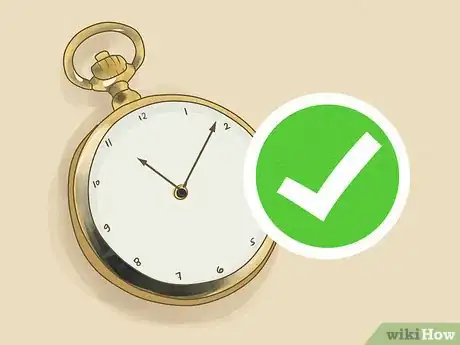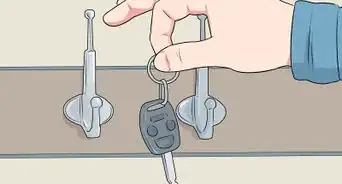This article was co-authored by Archana Ramamoorthy, MS and by wikiHow staff writer, Christopher M. Osborne, PhD. Archana Ramamoorthy is the Chief Technology Officer, North America at Workday She is a product ninja, security advocate, and on a quest to enable more inclusion in the tech industry. Archana received her BS from SRM University and MS from Duke University and has been working in product management for over 8 years.
wikiHow marks an article as reader-approved once it receives enough positive feedback. In this case, 91% of readers who voted found the article helpful, earning it our reader-approved status.
This article has been viewed 47,905 times.
There is no simple definition for what makes a good mentor, nor a single guide for becoming one. Mentors can be bosses, colleagues, teachers, peers, friends, or just about anyone who has the experience, determination, and temperament to be a helpful guide. If you want to be a good mentor, draw upon your existing skills and successes, but also be ready to learn and listen. Remember that mentoring is not a one-way street, and that a successful mentoring relationship will provide lasting benefits for both parties.
Steps
Providing Helpful Guidance
-
1Do your best and ask for help when needed. The main focus of being a mentor is to provide guidance as best you can, and to stay positive for both of you. If there's something you're both finding difficult, don't be afraid to ask someone else for help — such as a teacher if you're in school, an expert in the subject, someone more senior than you at your workplace, etc.[1]
- Good mentors don’t need to know everything; in fact, they need to know that they don’t know everything. Experience, expertise, and a record of success are all valuable attributes in a mentor. But so is having the confidence to admit your imperfections and willingness to seek out answers and guidance along with your mentee. Show them that this is what successful people do.
-
2Don’t panic if you don’t know an answer. Mentors are not computers or encyclopedias that have all the answers on a certain subject. Remember, this is a good thing, not a sign of your inadequacy. Turn your uncertainty regarding an answer into a learning (and mentoring) opportunity.
- Instead of making up a response or ignoring a question you’re not sure about, turn it back over to your mentee. Ask them something like "So how would you do it?". Listen to their response and find a way to build on it, with further questions, clarifications, or guidance.
EXPERT TIP"Mentorship is different for everyone. If you think you can't provide the person with what they need, you can connect them to someone new."
Archana Ramamoorthy is the Chief Technology Officer, North America at Workday She is a product ninja, security advocate, and on a quest to enable more inclusion in the tech industry. Archana received her BS from SRM University and MS from Duke University and has been working in product management for over 8 years.
Archana Ramamoorthy, MS
Chief Technology Officer, Workday Archana Ramamoorthy, MS
Archana Ramamoorthy, MS
Chief Technology Officer, Workday -
3Set a good example. If your mentee doesn’t have legitimate reasons to look up to you, respect you, and accept that you “practice what you preach,” why should they want you as a mentor to begin with? Set the right example both in how you approach the mentoring relationship and how you “live” the guidance you give.[2]
- Be punctual, prepared, and engaged for mentoring sessions. If it seems like a chore or a punishment for either of you, the relationship isn’t working.
- Mentoring isn’t a “do as I say, not as I do” kind of deal; it can, however, be a “do as I do, not as I’ve done” situation, in which you draw upon your past mistakes and failures for useful guidance.
-
4Be a guide for certain, and a friend if possible. Being a good mentor means being able to be objective and fair with your coaching and criticism. If this means you can’t be “buddy-buddy” with your mentee, so be it. Good mentors share a few similarities with good parents — one of them being that they don’t obsess over whether or not they’re “friends” with their charges.[3]
- This doesn’t mean that you can’t be a good mentor to a friend, though. You just have to make sure that your friendship doesn’t prevent you from giving the honest feedback that is necessary in a good mentoring relationship.
- Also, “don’t (necessarily) be a friend” isn’t the same thing as “don’t be friendly.” Be kind, approachable, and encouraging to your mentee; be an attentive and compassionate listener. Use discretion in regards to what is shared with you during sessions.
Offering Useful Encouragement
-
1Exude optimism. Being a mentor is a tough job, and so too is being mentored. It is common for mentees to be short on self-confidence to begin with, or to have their confidence shaken in the face of setbacks or criticism. As a mentor, be honest and realistic with your guidance and feedback, but do so with an air of optimism. Help your mentee believe that self-improvement is never out of reach.[4]
- Even when difficulties arise, never act like your mentee is failing or will never comprehend your guidance. If they don't do so well at a task or exam or project related to your mentoring, keep smiling and offer to help them with what they got wrong. If they do do well, feel proud of what they have accomplished with your help and congratulate them.
-
2Stay in control at all times. You might assume that only the mentee is apt to get upset or frustrated by poor results. However, you invest a lot into the relationship as a good mentor, and your own frustrations about not “getting through” to or adequately helping your mentee might cause you to project these emotions outwardly. Basically, you might be mad at yourself, but be tempted to direct this anger toward your mentee.
- Never, ever, curse at the learner, or say (or even intimate) that they are worthless or dim-witted. Not only will you crush their confidence, you will likely face sanctions if your mentorship has some sort of affiliation. Never let your frustrations get the best of you in front of your mentee. Take a break or make an excuse to cancel or cut a session short if necessary.
- Even if the problems are primarily the mentee’s doing, steer clear of accusatory “you” statements; stick with “I” and “we” statements that focus on things you can work on together. For instance, don’t say “If you would just pay attention to what I’m saying here….”; try “I think we need to find better ways to communicate with each other.”[5]
-
3Serve your mentee a steady diet of the "feedback sandwich”. Start by complimenting them, identifying some of their strongest points. Then nicely lay out some areas they need to work on. Be direct, but not unkind. Finish it off with some further encouragement, projecting a positive outcome of future efforts.[6]
- For instance: “The ideas you presented during yesterday’s conference call were fantastic. We should continue to work on your poise and delivery, though, so that the full impact of what you’re advocating for is felt by all. Just keep working hard and coming up with those great solutions, and before long you’ll be the one running the conference calls!”
-
4Lay on the praise. Make sure they know that you believe in them, and that you are aware of their efforts and improvements. Don’t withhold deserved praise, thinking that this withholding will help “toughen up” your mentee or stoke their motivation. When they’ve earned it, even for minor successes, give it to them.
- On the other side of the coin, don’t manufacture false praise just for the sake of saying something nice. You risk losing your credibility if your false praise is transparent. If your mentee has given you little reason to offer praise, focus your energies on constructive criticism and responding to their questions.
Creating a Good Environment
-
1Choose a time and place that’s good for both of you. Some mentoring relationships may operate on a consistent weekly schedule, while others are less rigidly structured. In any case, try not to force mentoring sessions into times or places full of distractions, or when one or both of you are exhausted or preoccupied.
- Pick a good place to mentor them in. You want to keep their attention on you, without them getting bored or their attention wandering. For school students, a library would be the traditional choice, and a good one too - it will be quieter than other places, there may be room to spread out books or papers, and if you need a book you're in the right place!
- Make sure you are always prepared for a mentoring session. Don’t try to squeeze in some mentoring when you’re distracted by a dozen other things, and reschedule a weekly session if necessary when you’ve been unable to properly prepare. A delayed but fully engaged session is far more beneficial than a half-hearted but on-schedule one.[7]
-
2Be patient and polite, and expect the same. Even if you combined the world’s most effective mentor with the world’s most eager mentee, you wouldn’t see some sort of immediate transformation. Mentoring is about incrementally laying the groundwork for lasting change and self-improvement. It’s not a race or a competition; it’s a process, and it requires patience from both sides.[8]
- Rome wasn’t built in day, and your mentee won’t be transformed after one session either. Whether they are fast or slow learners, remain calm. If they're not getting something, try to explain it in different ways until they do - or just come back to it later.
- Establish ground rules early on regarding mutual respect and accountability. Create an atmosphere in which some degree of personal sharing can occur and so-called “stupid questions” can be asked, but define the roles of mentor and mentee and the proper nature of interactions between the two.
-
3Encourage yourself as well. The mentee isn’t the only one who might question their abilities or results. There will be times when you’ll feel like you’re not doing a good enough job, or simply feel down because the results your mentee is working so hard for don’t seem to be paying off. Remind yourself that you are doing your best, and you are making a positive difference in this other person’s life.
- You don’t have to brag about your own success and experience in your field, or assume that such things mean that you are automatically a great mentor. However, you should draw on these realities as confidence-boosters in your ability to achieve your goals, including mentoring.[9]
- When your mentee is struggling, keep smiling and offer to help them. When they do succeed, feel proud of what they have accomplished with your help and congratulate them. Give yourself a pat on the back as well. Their success is something for both of you to be proud of.
-
4Be a mentor even at a distance. There will be times when you can’t meet with your mentee face-to-face, and some mentoring relationships may in fact be conducted entirely from a distance. Even if you do lose out on some of the interpersonal connection in such instances, you can develop and effective mentoring partnership regardless. Stay focused on the core concepts of support, guidance, constructive feedback, and accessibility.[10]
- In an online or similar distance-based mentorship, be available to your mentee but set boundaries as well. You don’t have to respond at 2 am if that is not the nature of your mentoring relationship.
- Use online resources to your advantage in distance mentoring. Locate helpful links, pages, forums, videos, documents, games, and so on. But don’t expect these to replace the core mentor-mentee connection that needs to be forged and maintained.
Warnings
- If they aren't receptive or pleasant when you meet them, then just do your best to build a positive relationship.⧼thumbs_response⧽
- Never yell or curse at the mentee.⧼thumbs_response⧽
- Be careful not to be too fun, though. You're there to help them learn, and they could end up taking advantage of you.⧼thumbs_response⧽
References
- ↑ http://www.forbes.com/sites/jacquelynsmith/2013/05/17/how-to-become-a-great-mentor/#af59ffa449e7
- ↑ http://www.forbes.com/sites/jacquelynsmith/2013/05/17/how-to-become-a-great-mentor/#af59ffa449e7
- ↑ http://www.inc.com/jayson-demers/7-key-qualities-of-an-effective-mentor.html
- ↑ http://www.forbes.com/sites/jacquelynsmith/2013/05/17/how-to-become-a-great-mentor/#af59ffa449e7
- ↑ http://polaris.gseis.ucla.edu/jrichardson/documents/mentor.htm
- ↑ http://www.inc.com/jayson-demers/7-key-qualities-of-an-effective-mentor.html
- ↑ http://www.inc.com/jayson-demers/7-key-qualities-of-an-effective-mentor.html
- ↑ http://www.forbes.com/sites/jacquelynsmith/2013/05/17/how-to-become-a-great-mentor/#af59ffa449e7
- ↑ http://polaris.gseis.ucla.edu/jrichardson/documents/mentor.htm
About this article
To be a good mentor, choose a meeting schedule that works well for both of you, like once a week at the library. Additionally, start off with something positive to motivate them before talking about areas where they can improve. You should also offer honest and constructive feedback during your meetings to help the person learn new skills. Finish the session by encouraging them to keep working towards their goal, which will help boost their confidence. For tips on how to keep yourself motivated as a mentor, read on!






























